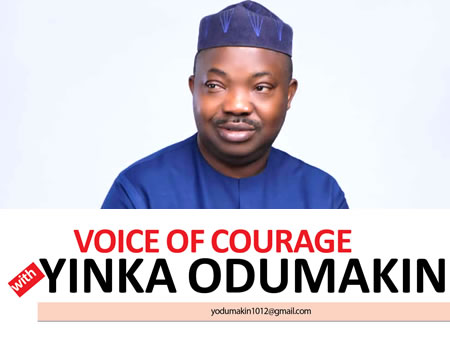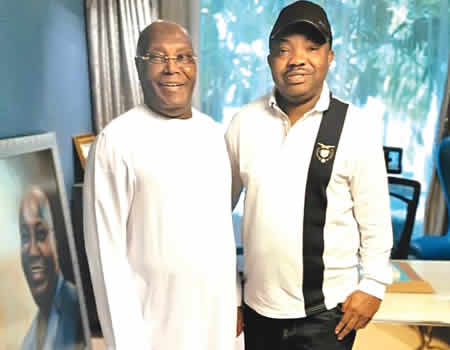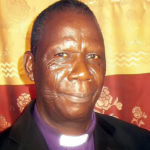As we sauntered into his house, one of his aides asked us to write our names on the visitors’ note and took it to him upstairs. Within minutes he was with us and two other guests who came to see him.
As we sat down chatting, a man who played influential role in the not-too-distant past of Nigeria admirably also walked in and we moved to the table for lunch. Atiku was still his calm and measured self in spite of the fact that the Supreme Court of Nigeria only two days earlier “drove” an aeroplane to speedily dismiss his petition against the victory of President Muhammadu Buhari in the last Presidential poll.
It was one election in which the zeal of Waziri Atiku Abubakar was put to test, as he believed he earned a victory which the Supreme Court has now promised to give reasons for not agreeing with him.
It was Professor Ango Abdullahi who once told me that the late Major Gen. Shehu Yar’Adua confided in him on why he advised the late MKO Abiola to pick Atiku as his running mate. The master tactician said that he knew General Ibrahim Babangida would not easily relinquish power and that Abiola would need a fighter like Atiku to get into office in the battle that would ensue.
It happened as Yar’Adua predicted but Abiola did not have an Atiku in the field of battle as he succumbed to pressures from the SDP governors in particular to pick Alhaji Babagana Kingibe as running mate. Kingibe ditched Abiola shortly after the June 12 election was annulled!
In a similar twist, the election Atiku contested was almost one between him and the network he built over the years and ordinary members of his party. This was complemented by the efforts of Nigerians who don’t belong to the PDP but were tired of APC.
Most of the PDP governors were known not to have supported the candidate of their party. Some of them were alleged to have made more donations to the party they were supposed to have been in opposition to in a classical case of chicanery and high-quality sabotage. What Atiku witnessed at their hands was enough to make a skimpy-heart faint.
Not a man of his stuff. He soldiered on and fought a good fight to have received the official figures he got in the election. His campaign was clear about the need to reset Nigeria back to federalism. He was not a convert to the idea. At the 1995 National Conference, he was on the Devolution of Power committee and their report was essentially about federalism.
He spoke with passion and deep understanding of the issues involved in federalism. I remember his speech at a lecture at the University of Nigeria Nsukka (UNN) where I was a guest about three years ago. I had made it to the lecture from the country home of the President-General of Ohaneze, Chief John Nwodo. Atiku told his listeners that it was the power of federalism that made the UCH in Ibadan a medical centre where the Saudi Royal family used to visit for medical treatment.
On another occasion in Lagos he talked about his native community having only about five policemen in the First Republic with all the effectiveness because they were indigenes of the community. They knew every honest people in the community and the rogues to go and challenge if anything got missing. He compared the situation to now that the same community has over 100 policemen who are less effective because they are deaf to criminals as most of them don’t speak the local language and blind to be able to pursue them since they don’t know the roads.
ALSO READ: Ekiti airport: PDP chieftain charges on standard, specification
Atiku would have been able to persuade the North to accept the message of federalism with all its benefits as nobody would have been able to blackmail him since he is a Northerner himself .
He would also have been able to rise above the fissiparous tendencies and unite the country around productivity which he has personal testimony in.
His detribalised nature and understanding of the deep sensitivities of the different sections of Nigeria would have made it very easy to commence the process of forging a united in Nigeria.
It has been a practical life issue for him.
General Muhammadu Buhari visited him in Lagos in 2015 shortly after emerging the winner of the APC primaries. The purpose of the visit was to seek his support in the general elections. Atiku promised to fully support Buhari only on one condition: he would not toy with the idea of a Muslim-Muslim ticket. Buhari was said to have bowed his head and looked up after about five minutes with a promise that he would not run with a Muslim.
About an hour after he left, a Muslim from the South-West with a serving governor and a former interim Chairman of their party walked into Atiku’s residence. The Muslim praised Atiku for the sacrifices he is always ready to make for democracy. He recalled how he stepped down for Abiola in 1993.
After he finished rendering all his composition, the former party Chairman took over and reportedly told Atiku: “We are here for an important matter. General Buhari did promise this man that he would make him his running mate before the primaries. Now that he has won, we need your assistance to get that fulfilled.”
Atiku looked them round and fixed his gaze at the former chair and said, “In 2007, when you handed me the AC ticket, did you remember you told me not to do a Muslim-Muslim ticket? What has changed now in 2015 for you to back a Muslim-Muslim ticket?”
Silence descended on the room and that was the end of the meeting.
This is the kind of leadership that Nigeria has missed as the judiciary brought a closure to the whole election process. How Nigeria survives without going back to federalism and its present reeling under exclusive leadership is one big question hanging in the air.
Speaking at a book launch in 2016, Atiku cut Nigeria’s job for it when he said:
“I have spoken a number of times in the past several years on the need to restructure our federation in order to devolve more power and resources to the federating units. Recently I went to Kaduna and told an audience of mostly my compatriots from the North, where most of the resistance against restructuring seems to come from, that restructuring is in the interest of the North and Nigeria…
“We must acknowledge that what got us to our current over-centralised, and centre-dominated federal system is political expediency and fear, and bolstered by the command and control character of military regimes. But after 50 years of “unitary federalism” we are now in a position to clearly see that it has not worked well. The federating units in the First Republic had their disagreements but none claimed to lack autonomy of action, and none waited for federal fiscal allocations before it could implement its programmes and pay salaries. The current structure may be working for some elite, but it has clearly not worked well for any section of this country and the country as a whole. We should take deliberate steps to change this structure to serve us better. And we should not dither for too long that we let fear and expediency stampede us into another disastrous policy shift that may not serve us well either. We have to acknowledge that federalisms are works in progress: there is no ideal federal system or so-called true federalism. Each nation has to work out the best federal system suited for it. In Nigeria’s case we must acknowledge that it is disingenuous if not outright dishonest to say that the system is not the problem. If the problem is just the operators how come we have failed for 50 years to produce the right people? Should we import them from outer space? A look at our 1999 constitution, specifically Section 7, which, as the Introduction to this book notes, has 83 legislative items as against 15 for the states (which the Federal Government can also override) shows that there is a huge problem with the system. I challenge anyone who is against restructuring our federation to show me another well-functioning federal system in the world with that level of lopsided central dominance. Individuals operate within certain structural and institutional constraints. If all we lack are good operators, as these people argue, would anyone advocate doing away with constitutions altogether so we rely on fantastic individuals to do the right things.”







